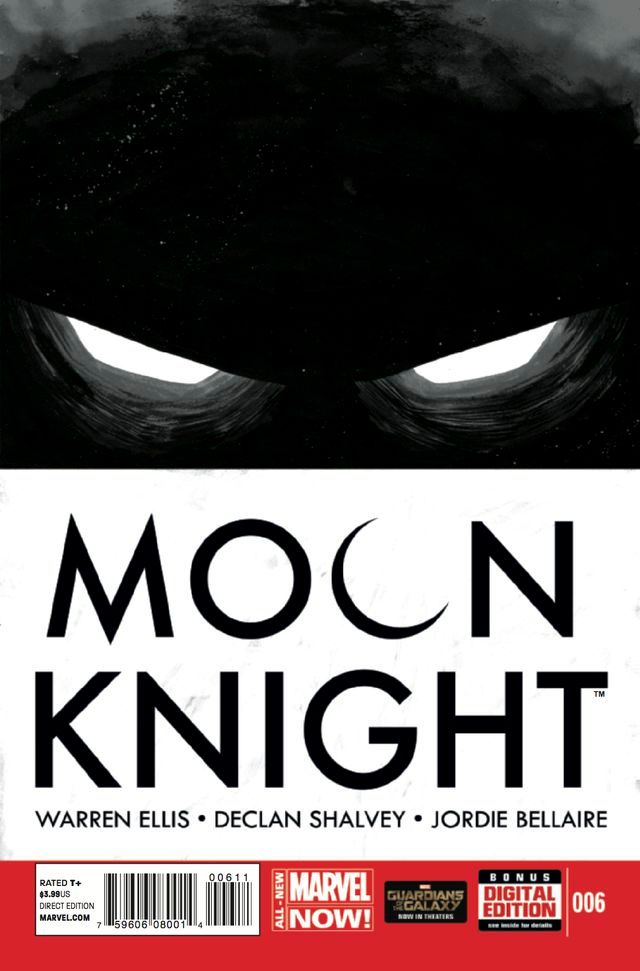Warren Ellis and Declan Shalvey cap off their brief but incredible run in "Moon Knight" #6 by introducing a new incarnation of Black Spectre, a stripped-down but similar version to the original created by Doug Moench and Bill Sienkiewicz over thirty years ago. It's a great way to end their run, as they pay tribute to an era that defined the character and reestablish the identity of the foe who could arguably be called Moon Knight's arch-enemy.
Ellis holds onto the basic motives that drove the original Black Spectre, and in fact works them into the context of the story, by making him the disgruntled and deeply disturbed beat cop Ryan Trent. Trent resents what he perceives as the glory-hogging Moon Knight getting all the credit for his crime-fighting efforts that should be rightfully his. On the story's second page, Shalvey depicts a brilliantly simple series of flashback panels that show Trent's unhappy and esteem-killing upbringing that, in that single page, explain exactly why the character would be predisposed to the attitude he demonstrates to his demeaning boss on the previous page, and his disinterested and oblivious wife on the subsequent one.
From there, Ellis and Shalvey dive straight into Trent's transformation into the new Black Spectre, with a kind of one-man grass roots approach that deftly strikes the balance between an unseen, off-panel origin, and an impossibly high-tech or cost-prohibitive conversion thanks to some contrived plot device, like a long-lost bank account or stash of A.I.M. or Hydra weapons. Shalvey captures this transformation in such a low-key manner that it's downright creepy, with a seemingly innocent series of moments that individually appear rather pedestrian, but when strung together, make Trent akin to a stalker moving in on his intended victim. These moments culminate in a decidedly disturbing single panel, where the point is clearly made, both literally and figuratively, as to the lengths Trent is prepared to go to fulfill his self-appointed mission. Never has a static shot of a pointed object coming at the reader worked so effectively when drawn by anyone not named Frank Miller.
As Black Spectre closes in on "Mr. Knight," Ellis finds a way to work in a couple of cameos from Moon Knight's supporting cast during Moench's run, and their appearance is a welcome connection to the past for longtime fans. These characters don't recall Moon Knight so fondly, though, and their bitter feelings are ironically later used to Trent's advantage against him, in a skillful twist by Ellis.
The depths that Ellis goes to in order to establish the origin of this villain is what makes the story breathe, and one that otherwise would have just been a derivative origin story of a one-dimensional character. Once his origin is established, and his transformation complete, Ellis and Shalvey have braced readers for a tense and fiery showdown, which they both deliver. The final eight pages read like a modern day, western-style shootout, only with aerial support and IED's.
Knowing that this is the new Black Spectre's first battle, Ellis portrays it as such; Trent makes mistakes but Ellis is careful not to make him into a bumbling super-villain wannabe. He figuratively trips over his own shoelaces, sure, but also gets a few good licks in. Shalvey and colorist Jordie Bellaire make this climatic battle the tightly-paced and explosive confrontation that it needs to be to serve as a fitting and thrilling end to the Ellis/Shalvey era on "Moon Knight."
Ellis has delivered the finest run on the character since those Moench days, and Shalvey has made the character a contender for best-dressed superhero. "Moon Knight" #6 is a superbly-done sendoff, and while these creators will be missed, they have infused the character with some new potential for future creators.

